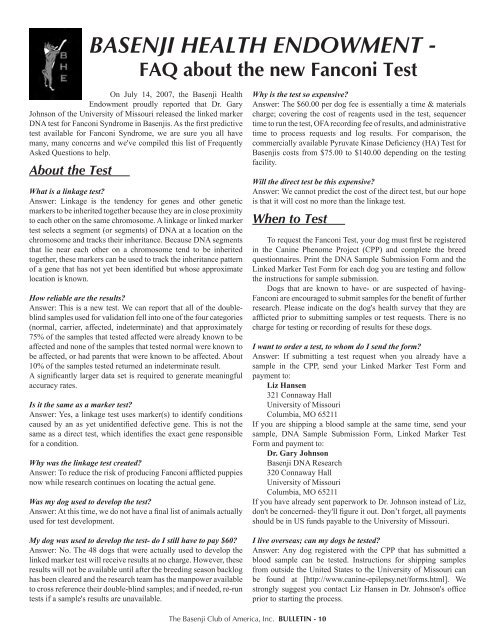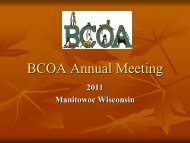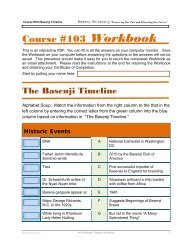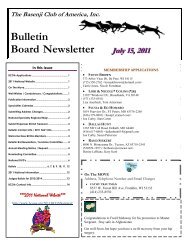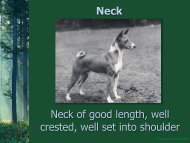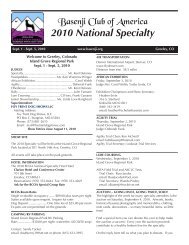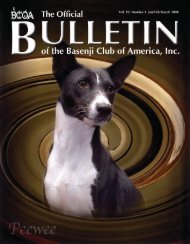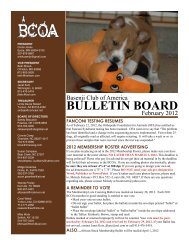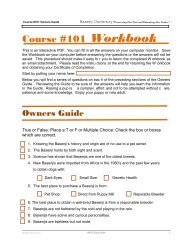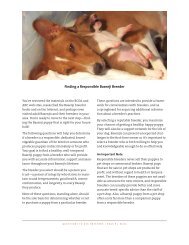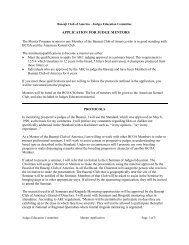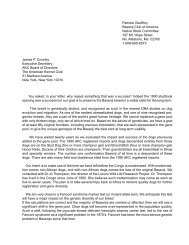BCOA Bulletin January-February-March 2007 - the Basenji Club of ...
BCOA Bulletin January-February-March 2007 - the Basenji Club of ...
BCOA Bulletin January-February-March 2007 - the Basenji Club of ...
You also want an ePaper? Increase the reach of your titles
YUMPU automatically turns print PDFs into web optimized ePapers that Google loves.
On July 14, <strong>2007</strong>, <strong>the</strong> <strong>Basenji</strong> Health<br />
Endowment proudly reported that Dr. Gary<br />
Johnson <strong>of</strong> <strong>the</strong> University <strong>of</strong> Missouri released <strong>the</strong> linked marker<br />
DNA test for Fanconi Syndrome in <strong>Basenji</strong>s. As <strong>the</strong> first predictive<br />
test available for Fanconi Syndrome, we are sure you all have<br />
many, many concerns and we've compiled this list <strong>of</strong> Frequently<br />
Asked Questions to help.<br />
About <strong>the</strong> Test<br />
BASENJI HEALTH ENDOWMENT -<br />
FAQ about <strong>the</strong> new Fanconi Test<br />
What is a linkage test?<br />
Answer: Linkage is <strong>the</strong> tendency for genes and o<strong>the</strong>r genetic<br />
markers to be inherited toge<strong>the</strong>r because <strong>the</strong>y are in close proximity<br />
to each o<strong>the</strong>r on <strong>the</strong> same chromosome. A linkage or linked marker<br />
test selects a segment (or segments) <strong>of</strong> DNA at a location on <strong>the</strong><br />
chromosome and tracks <strong>the</strong>ir inheritance. Because DNA segments<br />
that lie near each o<strong>the</strong>r on a chromosome tend to be inherited<br />
toge<strong>the</strong>r, <strong>the</strong>se markers can be used to track <strong>the</strong> inheritance pattern<br />
<strong>of</strong> a gene that has not yet been identified but whose approximate<br />
location is known.<br />
How reliable are <strong>the</strong> results?<br />
Answer: This is a new test. We can report that all <strong>of</strong> <strong>the</strong> doubleblind<br />
samples used for validation fell into one <strong>of</strong> <strong>the</strong> four categories<br />
(normal, carrier, affected, indeterminate) and that approximately<br />
75% <strong>of</strong> <strong>the</strong> samples that tested affected were already known to be<br />
affected and none <strong>of</strong> <strong>the</strong> samples that tested normal were known to<br />
be affected, or had parents that were known to be affected. About<br />
10% <strong>of</strong> <strong>the</strong> samples tested returned an indeterminate result.<br />
A significantly larger data set is required to generate meaningful<br />
accuracy rates.<br />
Is it <strong>the</strong> same as a marker test?<br />
Answer: Yes, a linkage test uses marker(s) to identify conditions<br />
caused by an as yet unidentified defective gene. This is not <strong>the</strong><br />
same as a direct test, which identifies <strong>the</strong> exact gene responsible<br />
for a condition.<br />
Why was <strong>the</strong> linkage test created?<br />
Answer: To reduce <strong>the</strong> risk <strong>of</strong> producing Fanconi afflicted puppies<br />
now while research continues on locating <strong>the</strong> actual gene.<br />
Was my dog used to develop <strong>the</strong> test?<br />
Answer: At this time, we do not have a final list <strong>of</strong> animals actually<br />
used for test development.<br />
My dog was used to develop <strong>the</strong> test- do I still have to pay $60?<br />
Answer: No. The 48 dogs that were actually used to develop <strong>the</strong><br />
linked marker test will receive results at no charge. However, <strong>the</strong>se<br />
results will not be available until after <strong>the</strong> breeding season backlog<br />
has been cleared and <strong>the</strong> research team has <strong>the</strong> manpower available<br />
to cross reference <strong>the</strong>ir double-blind samples; and if needed, re-run<br />
tests if a sample's results are unavailable.<br />
The <strong>Basenji</strong> <strong>Club</strong> <strong>of</strong> America, Inc. BULLETIN - 10<br />
Why is <strong>the</strong> test so expensive?<br />
Answer: The $60.00 per dog fee is essentially a time & materials<br />
charge; covering <strong>the</strong> cost <strong>of</strong> reagents used in <strong>the</strong> test, sequencer<br />
time to run <strong>the</strong> test, OFA recording fee <strong>of</strong> results, and administrative<br />
time to process requests and log results. For comparison, <strong>the</strong><br />
commercially available Pyruvate Kinase Deficiency (HA) Test for<br />
<strong>Basenji</strong>s costs from $75.00 to $140.00 depending on <strong>the</strong> testing<br />
facility.<br />
Will <strong>the</strong> direct test be this expensive?<br />
Answer: We cannot predict <strong>the</strong> cost <strong>of</strong> <strong>the</strong> direct test, but our hope<br />
is that it will cost no more than <strong>the</strong> linkage test.<br />
When to Test<br />
To request <strong>the</strong> Fanconi Test, your dog must first be registered<br />
in <strong>the</strong> Canine Phenome Project (CPP) and complete <strong>the</strong> breed<br />
questionnaires. Print <strong>the</strong> DNA Sample Submission Form and <strong>the</strong><br />
Linked Marker Test Form for each dog you are testing and follow<br />
<strong>the</strong> instructions for sample submission.<br />
Dogs that are known to have- or are suspected <strong>of</strong> having-<br />
Fanconi are encouraged to submit samples for <strong>the</strong> benefit <strong>of</strong> fur<strong>the</strong>r<br />
research. Please indicate on <strong>the</strong> dog's health survey that <strong>the</strong>y are<br />
afflicted prior to submitting samples or test requests. There is no<br />
charge for testing or recording <strong>of</strong> results for <strong>the</strong>se dogs.<br />
I want to order a test, to whom do I send <strong>the</strong> form?<br />
Answer: If submitting a test request when you already have a<br />
sample in <strong>the</strong> CPP, send your Linked Marker Test Form and<br />
payment to:<br />
Liz Hansen<br />
321 Connaway Hall<br />
University <strong>of</strong> Missouri<br />
Columbia, MO 65211<br />
If you are shipping a blood sample at <strong>the</strong> same time, send your<br />
sample, DNA Sample Submission Form, Linked Marker Test<br />
Form and payment to:<br />
Dr. Gary Johnson<br />
<strong>Basenji</strong> DNA Research<br />
320 Connaway Hall<br />
University <strong>of</strong> Missouri<br />
Columbia, MO 65211<br />
If you have already sent paperwork to Dr. Johnson instead <strong>of</strong> Liz,<br />
don't be concerned- <strong>the</strong>y'll figure it out. Don’t forget, all payments<br />
should be in US funds payable to <strong>the</strong> University <strong>of</strong> Missouri.<br />
I live overseas; can my dogs be tested?<br />
Answer: Any dog registered with <strong>the</strong> CPP that has submitted a<br />
blood sample can be tested. Instructions for shipping samples<br />
from outside <strong>the</strong> United States to <strong>the</strong> University <strong>of</strong> Missouri can<br />
be found at [http://www.canine-epilepsy.net/forms.html]. We<br />
strongly suggest you contact Liz Hansen in Dr. Johnson's <strong>of</strong>fice<br />
prior to starting <strong>the</strong> process.


